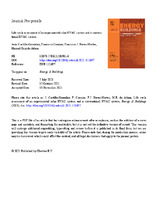Life cycle assessment of an experimental solar HVAC system and a conventional HVAC system
Autor
Castillo González, J.
Comino Montilla, Francisco
Navas-Martos, F.J.
Ruiz de Adana, Manuel
Editor
ElsevierFecha
2021Materia
LCASolar cooling
Adsorption
Environmental impact
SimaPro
METS:
Mostrar el registro METSPREMIS:
Mostrar el registro PREMISMetadatos
Mostrar el registro completo del ítemResumen
Solar heating ventilating air conditioning systems are useful tools to meet the objectives of the European Commission in terms of sustainability in buildings, since their use can reduce the environmental impact, including CO2 emissions, due to their low energy consumption. In order to quantify the improvement that in environmental terms the use of this type of system could entail, in this work it was carried out (a) a comparative life cycle assessment of a solar heating ventilating air conditioningsystem based on vaporative ooling and desiccant wheel with a conventional direct expansion system; and (b) an analysis of feasible modifications of the desiccant wheel based system and their influence on the life cycle analysis results. The experimental desiccant wheel based system showed a slightly higher environmental performance than the conventional direct expansion based system, between 2% and 10%, for the 3 impact categories evaluated: human health, ecosystem quality and resource consumption. When weight optimisation and the reuse of materials were considered, the environmental performance of the experimental based system became even up to between 22% and 50% higher than that of the conventional direct expansion based system. That involved a 60 % reduction in climate change potential indicator, which mainly was influenced by CO2 emissions.

